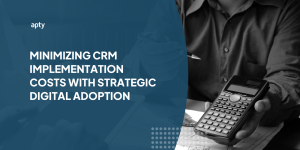Customer data is the cornerstone of strategic decision-making, and ensuring the integrity and compliance of this data within Customer Relationship Management (CRM) systems is paramount. The challenge of CRM compliance — adhering to legal standards and regulations while managing customer information — is a pressing concern for businesses globally. This is further compounded by the need for seamless CRM adoption, where users must navigate complex functionalities efficiently to leverage the full potential of CRM technologies.
Digital Adoption Platforms (DAPs) are crucial for maintaining CRM data integrity and compliance. DAPs play a crucial role in this ecosystem, offering a bridge between advanced CRM features and the everyday user. Simplifying the user experience and guiding individuals through intricate CRM processes, DAPs ensure that data is entered accurately and maintained in full compliance with regulatory standards.
Integrating DAPs within CRM systems addresses two critical needs: enhancing CRM data security and quality and facilitating the smooth adoption of CRM software across organizations. This dual capability makes DAPs indispensable for businesses seeking to optimize their CRM investments while ensuring compliance with data protection laws and industry regulations.
DAPs offer a layer of guidance and support directly within the CRM application, ensuring users can easily and accurately navigate complex processes. As regulations become more intricate and the volume of data continues to grow, the role of DAPs in ensuring CRM systems are used to their full potential while adhering to compliance standards has never been more critical. They become the bridge between sophisticated CRM functionalities and the users’ ability to leverage these features fully, ensuring data is entered correctly, maintained diligently, and protected rigorously.
Delving into the benefits of digital adoption platforms, we uncover their pivotal role in facilitating CRM software adoption and ensuring compliance with mandates.
The Importance of CRM Compliance
In today’s regulatory environment, CRM compliance is not just a legal requirement; it’s a cornerstone of customer trust and operational integrity. Compliance encompasses a broad spectrum, from the General Data Protection Regulation (GDPR) in Europe to the California Consumer Privacy Act (CCPA) in the United States. It extends to industry-specific regulations that govern the handling of customer data.
The stakes of non-compliance are high, ranging from hefty fines to irreparable damage to a company’s reputation. Beyond the immediate legal implications, failing to adhere to compliance standards can degrade customer trust, a critical asset in the digital age. Customers today are more informed and concerned about their data privacy than ever before, and they expect businesses to treat their information with the utmost care and respect.

The role of DAPs in CRM compliance is multifaceted. Embedding contextual guidance and support within CRM systems, DAPs ensure that users are aware of compliance requirements and equipped to follow them in their daily operations. This support ranges from simple reminders about data entry standards to complex guidance on handling sensitive information by specific regulations.
Moreover, DAPs can provide analytics and reporting features that help businesses monitor and audit their CRM data practices. This capability is invaluable for identifying potential compliance issues before they escalate into problems, allowing businesses to maintain a proactive stance on data integrity and security.
Integrating DAPs into CRM systems transforms compliance from a daunting challenge into a manageable aspect of daily operations. It empowers businesses to uphold high data integrity and privacy standards, ensuring that they not only meet legal requirements but also build and maintain trust with their customers.
Enhancing CRM Data Quality with DAPs
Ensuring data quality within CRM systems is a continuous challenge for organizations. High-quality data is the lifeblood of effective CRM strategies, driving personalized customer interactions, accurate analytics, and strategic decision-making. However, maintaining this quality requires constant vigilance against data decay, duplication, and inaccuracies that can compromise CRM effectiveness.
Digital Adoption Platforms (DAPs) are pivotal in addressing these challenges. By integrating directly with CRM systems, DAPs provide real-time guidance to users, ensuring data is entered correctly from the outset. This proactive approach to data entry reduces the likelihood of errors and instills best practices among users, promoting a culture of data quality.
DAPs go beyond mere data entry support. They offer sophisticated data validation and cleaning tools, alerting users to potential errors or duplications before they become entrenched in the system. This immediate feedback loop is essential for maintaining the accuracy and reliability of CRM data.

Furthermore, DAPs are crucial in training and onboarding users on the CRM system. They deliver personalized, just-in-time training that adapts to the user’s role and context within the CRM, ensuring that every user understands how to input, manage, and interpret data correctly. This targeted training is crucial for organizations with complex CRM systems or those undergoing digital transformation, where the risk of data quality issues is heightened.
The impact of DAPs on CRM data quality is significant. Ensuring data is accurately entered, maintained, and cleansed, DAPs enhance the overall integrity of CRM systems. This, in turn, supports more effective customer relationship management, enabling organizations to leverage their CRM investments fully and drive business growth.
Integrating DAPs into CRM strategies is not just a boon for compliance; it’s a critical component for ensuring data quality. As businesses continue to navigate the complexities of digital transformation, the role of DAPs in maintaining pristine CRM data becomes increasingly indispensable.
Securing CRM Data through Digital Adoption Platforms
In the digital age, securing customer data within CRM systems is not just a priority; it’s a necessity. As organizations collect and store an ever-increasing volume of customer information, the risks of data breaches, unauthorized access, and data theft escalate. The repercussions of such security lapses can be devastating, including legal penalties, financial losses, and long-lasting damage to brand reputation.

Digital Adoption Platforms (DAPs) offer a robust solution to these security challenges. By embedding within CRM systems, DAPs serve as a proactive guardrail for data security, guiding users through secure data handling practices and ensuring compliance with data protection laws.
DAPs contribute to CRM data security in several key ways:
- User Authentication and Access Control: DAPs can facilitate the enforcement of strong authentication measures and role-based access controls within CRM systems. This ensures that sensitive customer data is accessible only to authorized personnel, reducing the risk of internal and external data breaches.
- Data Encryption and Masking: Through guidance and automated workflows, DAPs help enforce policies around data encryption and masking, ensuring that data is securely stored and transmitted. This minimizes the vulnerability of data during interactions within the CRM system.
- Security Awareness Training: DAPs deliver targeted, context-sensitive training on security best practices directly within the CRM environment. This real-time education helps raise awareness among users about potential security threats and the importance of adhering to security protocols.
- Compliance with Data Protection Regulations: With regulations like GDPR and CCPA setting strict guidelines for data security, DAPs play a critical role in helping organizations navigate these requirements. They ensure that all data handling within the CRM system aligns with legal standards, avoiding costly compliance violations.
- Integrating DAPs into their CRM strategies, organizations enhance the security of their customer data and build a culture of security awareness and compliance. This proactive approach to data security positions businesses to better protect their customers’ information, maintain customer trust and avoid the pitfalls of data security breaches.
The role of DAPs in securing CRM data is invaluable. As threats to data security grow more sophisticated, the ability of DAPs to provide real-time guidance, enforce security measures, and ensure compliance becomes ever more critical. Investing in DAPs is investing in the security and integrity of customer data, a foundational element of digital trust and business resilience.
CRM Data Management Best Practices
Effective management of CRM data is foundational to leveraging the full potential of customer relationship management systems. It’s more than just collecting and storing information; it’s about ensuring the data is organized, accessible, and actionable. Implementing best practices in CRM data management is crucial for optimizing CRM strategies, enhancing customer interactions, and driving business growth.

1. Regular Data Audits and Cleansing: Regular audits of CRM data are vital to identify and rectify inaccuracies, duplicates, and outdated information. Cleansing data consistently ensures that the CRM system remains a reliable source of truth for decision-making and customer engagement.
2. User Access Control and Permissions: Establishing clear user roles and permissions within the CRM system helps prevent unauthorized access and data breaches. Organizations can safeguard sensitive information and maintain data integrity by controlling who can view, edit, or delete data.
3. Data Entry and Validation Standards: Setting standards for data entry and implementing validation rules are essential for maintaining data quality. These standards help ensure that data is consistent, accurate, and formatted correctly across the CRM system.
4. Integration and Data Consistency: Ensuring the CRM system is seamlessly integrated with other business systems (e.g., marketing automation sales platforms) is critical for data consistency and completeness. This integration facilitates a unified view of customer interactions and enhances analytical insights.
5. Training and User Adoption: Providing comprehensive training and support for CRM users is crucial for effective data management. Educating users on best practices, data security, and the strategic use of CRM data can significantly enhance the quality of data entered into the system.
6. Digital Adoption Platforms (DAPs): They are instrumental in supporting these best practices. By providing real-time guidance, training, and support within the CRM system, DAPs ensure that users are equipped to manage data effectively. They help enforce data entry standards, facilitate user training, and support the integration of CRM with other systems, thereby enhancing the overall quality and security of CRM data management.
Incorporating DAPs into CRM data management strategies streamlines operations and empowers organizations to extract maximum value from their CRM investments. With DAPs, businesses can foster a data-driven culture, optimize customer relationships, and drive sustained growth.
The Impact of Digital Transformation in CRM
The landscape of customer relationship management is continually reshaped by digital transformation. As organizations strive to meet evolving customer expectations and adapt to a dynamic market environment, the role of CRM systems has expanded beyond mere customer data storage to become a strategic hub for customer engagement, analytics, and personalized marketing.

Digital transformation in CRM involves leveraging advanced technologies—such as artificial intelligence (AI), machine learning, and cloud computing—to enhance the functionality, accessibility, and scalability of CRM systems. These technologies enable businesses to derive deeper insights from their CRM data, automate complex processes, and provide a seamless customer experience across multiple channels.
Key Aspects of Digital Transformation in CRM:
Personalization: AI and machine learning algorithms analyze customer data to deliver personalized experiences, recommendations, and services, increasing engagement and loyalty.
Mobility: Cloud-based CRM solutions ensure that sales, marketing, and customer service teams can access and update CRM data from anywhere, fostering greater flexibility and responsiveness.
Scalability: Digital transformation enables CRM systems to scale with the business, accommodating growing data volumes and user needs without compromising performance.
Integration: Advanced CRM systems are designed to integrate seamlessly with other business applications, creating a cohesive ecosystem that enhances data flow and operational efficiency.
Analytics: Enhanced analytics capabilities allow businesses to gain actionable insights into customer behavior, sales trends, and marketing effectiveness, driving strategic decisions.
Digital Adoption Platforms (DAPs) are at the forefront of facilitating this transformation. Guiding users through the new functionalities introduced by digital transformation, DAPs ensure that organizations can fully leverage the advanced features of their CRM systems. They are crucial in training and onboarding users on these technologies, accelerating adoption, and maximizing the ROI from CRM investments.
The impact of digital transformation on CRM is profound. It enhances operational efficiency and customer satisfaction and empowers organizations to stay competitive in a rapidly changing business environment. With the support of DAPs, businesses can navigate the complexities of digital transformation in CRM, ensuring they harness the full potential of their CRM systems to drive growth and innovation.
Navigating CRM Success with Digital Adoption Platforms
In the journey towards digital excellence in customer relationship management, the synergy between CRM systems and Digital Adoption Platforms (DAPs) emerges as a critical business strategy. This partnership addresses the technical challenges of data integrity, compliance, and security and paves the way for a transformative approach to managing customer relationships in the digital age.
Integrating DAPs with CRM systems is not merely a technological upgrade; it’s a strategic investment in enhancing operational efficiency, ensuring data compliance, and unlocking the full potential of CRM technologies. By guiding users through complex processes, enforcing best practices, and facilitating the seamless adoption of advanced features, DAPs empower organizations to elevate their CRM strategies.
The benefits of leveraging DAPs in CRM initiatives are clear:
- Improved data quality
- Robust security measures
- Compliance with regulatory standards
- A culture of continuous learning and improvement
These advantages contribute to a stronger foundation for customer trust, deeper insights into customer behavior, and, ultimately, more effective engagement strategies.
As we look to the future, the role of Digital Adoption Platforms in driving CRM success will grow more significantly. In a landscape marked by rapid technological advancements and evolving customer expectations, DAPs stand out as essential tools for businesses seeking to navigate the complexities of digital transformation in CRM. Investing in DAPs is investing in the future of customer relationship management—a future where data-driven decisions, personalized customer experiences, and operational agility are the cornerstones of business growth and innovation.
The journey toward CRM excellence is ongoing, but with Digital Adoption Platforms, businesses have a powerful ally in navigating this path. By embracing DAPs, organizations can ensure that their CRM systems are not just repositories of customer data but dynamic growth and customer satisfaction engines.












